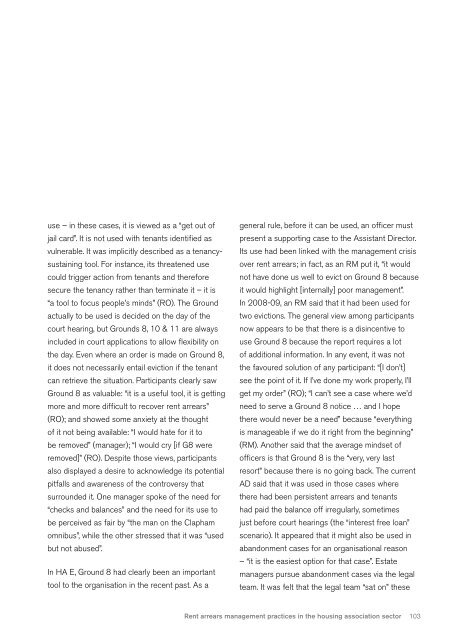Rent arrears management practices in the housing association sector
Rent arrears management practices in the housing association sector
Rent arrears management practices in the housing association sector
Create successful ePaper yourself
Turn your PDF publications into a flip-book with our unique Google optimized e-Paper software.
use – <strong>in</strong> <strong>the</strong>se cases, it is viewed as a “get out of<br />
jail card” . It is not used with tenants identified as<br />
vulnerable . It was implicitly described as a tenancysusta<strong>in</strong><strong>in</strong>g<br />
tool . For <strong>in</strong>stance, its threatened use<br />
could trigger action from tenants and <strong>the</strong>refore<br />
secure <strong>the</strong> tenancy ra<strong>the</strong>r than term<strong>in</strong>ate it – it is<br />
“a tool to focus people’s m<strong>in</strong>ds” (RO) . The Ground<br />
actually to be used is decided on <strong>the</strong> day of <strong>the</strong><br />
court hear<strong>in</strong>g, but Grounds 8, 10 & 11 are always<br />
<strong>in</strong>cluded <strong>in</strong> court applications to allow flexibility on<br />
<strong>the</strong> day . Even where an order is made on Ground 8,<br />
it does not necessarily entail eviction if <strong>the</strong> tenant<br />
can retrieve <strong>the</strong> situation . Participants clearly saw<br />
Ground 8 as valuable: “it is a useful tool, it is gett<strong>in</strong>g<br />
more and more difficult to recover rent <strong>arrears</strong>”<br />
(RO); and showed some anxiety at <strong>the</strong> thought<br />
of it not be<strong>in</strong>g available: “I would hate for it to<br />
be removed” (manager); “I would cry [if G8 were<br />
removed]” (RO) . Despite those views, participants<br />
also displayed a desire to acknowledge its potential<br />
pitfalls and awareness of <strong>the</strong> controversy that<br />
surrounded it . One manager spoke of <strong>the</strong> need for<br />
“checks and balances” and <strong>the</strong> need for its use to<br />
be perceived as fair by “<strong>the</strong> man on <strong>the</strong> Clapham<br />
omnibus”, while <strong>the</strong> o<strong>the</strong>r stressed that it was “used<br />
but not abused” .<br />
In HA E, Ground 8 had clearly been an important<br />
tool to <strong>the</strong> organisation <strong>in</strong> <strong>the</strong> recent past . As a<br />
general rule, before it can be used, an officer must<br />
present a support<strong>in</strong>g case to <strong>the</strong> Assistant Director .<br />
Its use had been l<strong>in</strong>ked with <strong>the</strong> <strong>management</strong> crisis<br />
over rent <strong>arrears</strong>; <strong>in</strong> fact, as an RM put it, “it would<br />
not have done us well to evict on Ground 8 because<br />
it would highlight [<strong>in</strong>ternally] poor <strong>management</strong>” .<br />
In 2008-09, an RM said that it had been used for<br />
two evictions . The general view among participants<br />
now appears to be that <strong>the</strong>re is a dis<strong>in</strong>centive to<br />
use Ground 8 because <strong>the</strong> report requires a lot<br />
of additional <strong>in</strong>formation . In any event, it was not<br />
<strong>the</strong> favoured solution of any participant: “[I don’t]<br />
see <strong>the</strong> po<strong>in</strong>t of it . If I’ve done my work properly, I’ll<br />
get my order” (RO); “I can’t see a case where we’d<br />
need to serve a Ground 8 notice … and I hope<br />
<strong>the</strong>re would never be a need” because “everyth<strong>in</strong>g<br />
is manageable if we do it right from <strong>the</strong> beg<strong>in</strong>n<strong>in</strong>g”<br />
(RM) . Ano<strong>the</strong>r said that <strong>the</strong> average m<strong>in</strong>dset of<br />
officers is that Ground 8 is <strong>the</strong> “very, very last<br />
resort” because <strong>the</strong>re is no go<strong>in</strong>g back . The current<br />
AD said that it was used <strong>in</strong> those cases where<br />
<strong>the</strong>re had been persistent <strong>arrears</strong> and tenants<br />
had paid <strong>the</strong> balance off irregularly, sometimes<br />
just before court hear<strong>in</strong>gs (<strong>the</strong> “<strong>in</strong>terest free loan”<br />
scenario) . It appeared that it might also be used <strong>in</strong><br />
abandonment cases for an organisational reason<br />
– “it is <strong>the</strong> easiest option for that case” . Estate<br />
managers pursue abandonment cases via <strong>the</strong> legal<br />
team . It was felt that <strong>the</strong> legal team “sat on” <strong>the</strong>se<br />
<strong>Rent</strong> <strong>arrears</strong> <strong>management</strong> <strong>practices</strong> <strong>in</strong> <strong>the</strong> hous<strong>in</strong>g <strong>association</strong> <strong>sector</strong> 103




